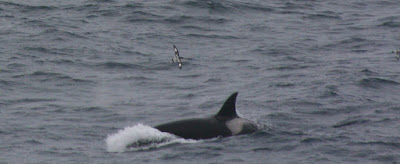Icebergs And Orca

On 15th December, we passed 60 ° south which officially means that we are in Antarctica! The day unfolded like no other on board - whilst climbing up onto Monkey Island, I caught a glimpse of dorsal fins in my peripheral vision. As I hurried onto the deck, Ryan had already spotted a male orca, two females and then.... a calf surfaced right next to its mother. The group were so close to the boat that we could see them perfectly. Orca, Orchinus orca, are a species with a cosmopolitan distribution. Within the orca species, different ecotypes have been identified according to ocean basins ie. North Atlantic ecotypes, North Pacific and Antarctic. Ecotypes arise due to evolutionary processes which generate genetically distinct populations that can no longer interbreed. Orca ecotypes often look different, prey upon different food sources, maintain geographically distinct ranges and even adopt different vocal communication. When implementing conservation measures for marine ecosystems, t

